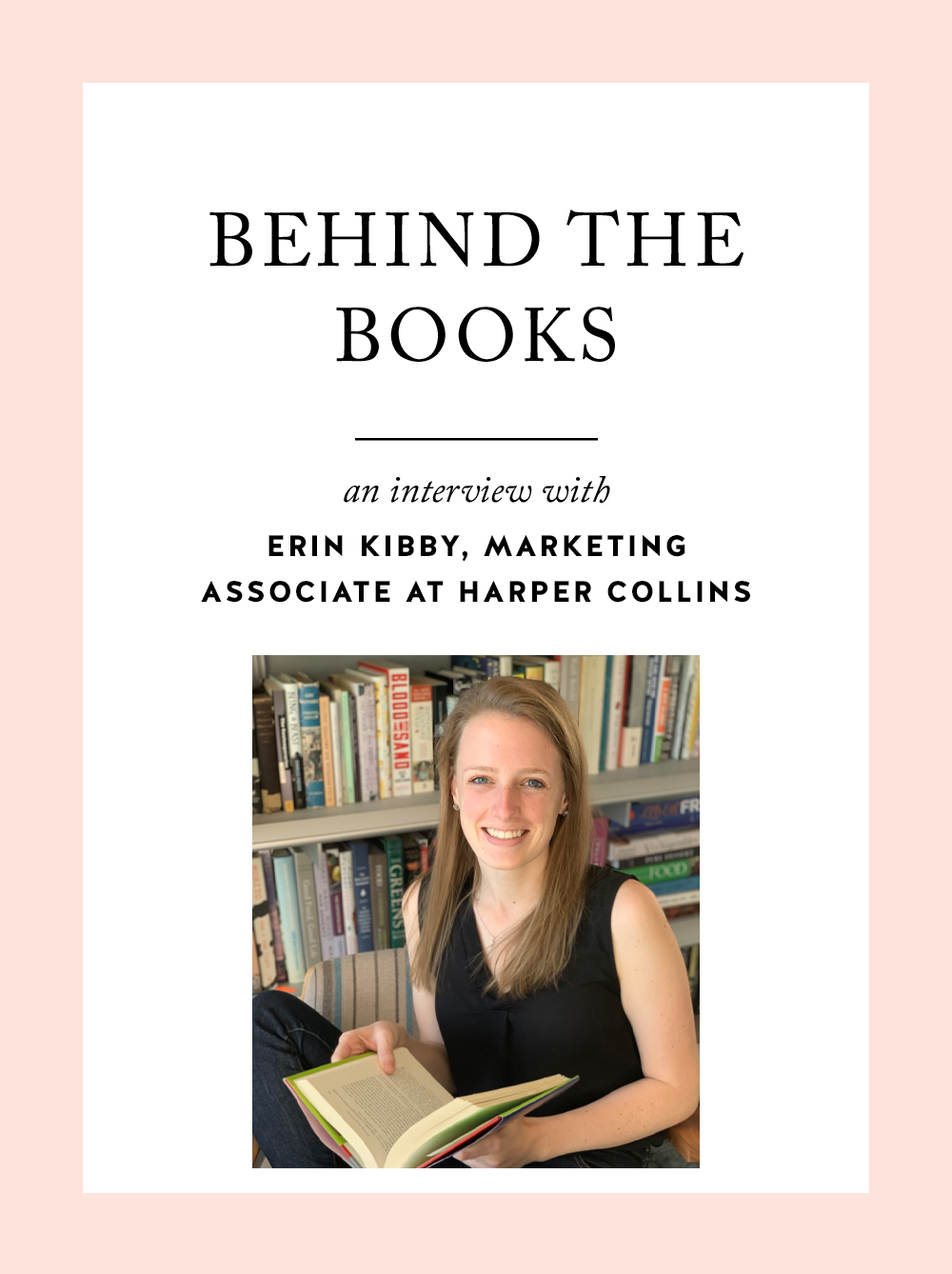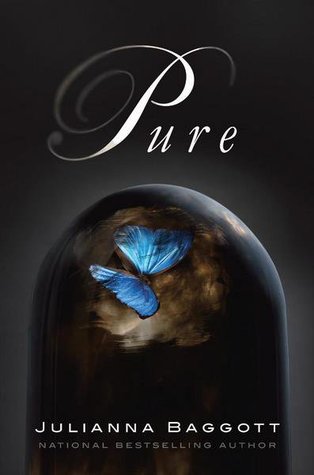
Today I’m back with my third Behind the Books post and I’m so excited to share my conversation with Erin Kibby, who works as a marketing associate at HarperCollins. Erin’s enthusiasm for what she does is infectious and it was so fun to hear her talk about why she loves her role in book marketing. After winning an essay contest in middle school describing how she wanted to be a book publisher in New York City, Erin went on to internships at publishing houses and eventually landed at the Columbia Publishing Course. Erin was later recruited by one of the “big five” publishing houses, HarperCollins, where she now works in marketing on adult fiction and non-fiction as well as cookbooks and design books. As a marketing associate, Erin helps to get these books in front of the right readers by utilizing a variety of avenues – social media, advertising, influencer and organization outreach, as well as in-person work with the sales team to reach booksellers and the publicity department to reach readers directly. As you can tell, there’s a ton of variety in this job and Erin had her first NYT bestseller in the fall of 2020 – a huge milestone! Read on to learn more about Erin and the behind-the-scenes of book marketing!
A Day in the Life:
What my day looks like definitely depends on the literal day of the week and the titles I have coming up! Books publish on Tuesdays, so if I have a book going on sale that week or month even, I’ll use the days leading up to it to make sure the campaign and all elements are ready and running effectively. This involves coordinating with other teams, scheduling content on social media, and communicating heavily with the author and agent on timelines and content and messaging for the book so everything aligns and is ready. In my role, it’s a whole lot of emails. I provide instruction to our design and video department on what assets should look like, and then route drafts and final assets to the editor, author, and agent. I communicate frequently with other departments – like publicity, sales, and editorial – to talk about the campaign, promotions, pitching and placements, and on-going project updates for each book. I’ll spend time doing research or outreach to influencers or readers, planning giveaways or a digital book tour for launch. I create advertising campaigns and social posts, coordinate brand partnerships, and honestly a lot more. I have calls with authors and agents, talking through efforts, updates, helping them with their website or social media or getting the book to their contacts. I juggle around 8 books per season, 3 seasons a year, and the timeframe on them is quite continuous. For example, we’re currently planning everything for this fall (2021), I’m still actively working on titles from last fall (2020), and I’m busy working on this winter’s season and summer to come (both 2021). So, it’s a lot of multitasking on a lot of books at all stages of publication – but it’s never boring!
What It Takes to be a Good Book Marketer:
Good communication is essential. Knowing how to communicate clearly is very important, especially when relaying details to authors and agents or helping explain a book to a sales rep before they go to a buyer. I write pitch emails, bookseller letters, corporate updates, and more, all of which need to be done concisely and yet be detailed, upbeat and realistic. Since Covid, email communication has been even more important – everything is written down so you need to make sure that what you say is correct and are clear as possible. Obviously, excitement is super important to the job. I could be making two to three times more in salary working in marketing at an agency or corporation, but I never will. It’s the love of books that draws us in to this profession. You have to be more than just a dedicated reader. You have to be dedicated to wanting to be part of the process to bring these books into the world. It’s not always glamorous, like what you see on Younger (the tv show) – publishing a book is a long process and involves a whole lot of work; and you may not always love the books you work on. But to see your book on a shelf at a store or social media or on TV – it’s very rewarding.
The Best Parts:
I honestly love working with the books and authors and coworkers who are all dedicated to putting books out into the world for readers. It’s such a unique group of people, all of us dedicated to the craft of literature and free speech and diverse storytelling. Every book is new and exciting, not only to my personal work title list but also to the world, so getting to play a part in bringing it to life is so meaningful to me. In marketing, I get to have a pretty direct look into what readers want and how they want to be approached about that topic and books in general, which provides me with great opportunities for creativity in reaching out and sharing a book with them. The sky is the limit – well, within budget!
The Biggest Challenges:
The biggest challenges I faced in my role were when I was at a smaller house. Nothing against indie or small publishing houses at all – they have their advantages too. But with less staff it means you do more – which is great for gaining experience but bad for stress levels and balance. Different bosses also prefer different kinds of writing or campaign efforts or photographs for social media promotion, and as a lower-level employee (entry level and just above) it can be hard to feel like you have a voice or choice in certain situations. I imagine this is the case pretty much everywhere so it’s not all that bad. So being adaptable, mentally prepared for multitasking and stress – it can be a challenge at first.
How COVID has Changed Things:
Since everyone now works remotely, there have been some changes in my job but mostly not. Marketing for me has always been 90% a desk job and previously 10% mailings, but during these times we’ve outsourced all mailing execution to our warehouses. Now everything I do is on my computer. Other jobs I imagine changed more – like production and video shooting and such that used to be very hands-on have had to adapt, and I’m not honestly even sure how they have. The industry is doing well, despite the current craziness! At the beginning of Covid and now even all this time later, it’s been great to see so many people come back to reading – even if only out of sheer boredom after watching everything available on Netflix. Kids and teens continue to come to books, and political books have seen a huge surge in the last year or so as have several other genres and categories. Audiobooks are down, since less people are commuting, but digital reading is doing well again.
On Challenges Facing the Book World Today:
I think there are a lot of challenges facing the book industry today. We need to be better about diversity, when it comes to our authors, the topics of our books, and who we hire. The publishing industry is historically known as a rich white man’s industry, and I do think that’s still pretty true today. When I was a student at CPC, less than 10% of our class was Black, and about the same percentage were male. In my current job, I have one male coworker, editorial has more, publicity has none, and all the top execs are white men. It’s about the same when it comes to BIPOC representation as well. I think the industry needs to be better about hiring diverse candidates and helping them grow in the industry to get to positions of greater power. We also need more books by diverse authors – so many more. There are so many articles out there explaining why and I’m not going to pretend to be the best authority on the topic (me, a white millennial), but our books need to be better representations of our readers and our authors need to be representative to the diversity of our society as a whole. Everyone from agents to publishers need to actively seek out diverse authors and stories, and then put at least equal effort and money behind them. I also think the way media exists now has changed the way people want to consume books. Fiction will always be a form of escapism, I think. Some nonfiction will have to evolve to meet the rapidity of the media and news cycles. In 2021 and beyond, pandemic books are going to be everywhere – and yet the media is still bombarding us with the news of it and the situation is constantly changing. Same for books about corporate tech giants or the environment. Those books should all still be written, but I think the attention span of consumers is much shorter now and so the timeliness of a story is crucial to grabbing and maintaining a reader’s interest.
On the Ups and Downs of Social Media and #Bookstagram:
I started my bookstagram account (@BrooklynBookFanatic) in the summer of 2016 right after I graduated from CPC. A few other students and I decided to make accounts. Personally, I wanted to use it to stay active in the industry while job hunting, sort of as a resume buffer, as well as get new book recommendations as I settled into the city and bought a bookshelf I wanted to fill. Bookstagram is a very fun hobby. I’ve been on it for almost 5 years now and barely have 2.5K followers, which is quite small compared to some of the bookstagram giants that just started out. But I do bookstagram for me. I post when I have time, I talk about the books I’m reading or want to read. I like taking pictures and brainstorming ideas for reels. I love seeing everyone else’s content, leaving comments, sliding into people’s DMs and becoming book friends with them. It’s a safe space, where you can talk about mental health or anxiety or illness or heartbreak. And it’s a celebratory space, whether it’s your birthday or bookstaversary or you got engaged or met your annual reading goal. The communal feel is really nice, and something I’ll come back to for a long time still. Working in marketing and digital marketing, social media is a huge aspect of my job. So bookstagram is also great for getting insight into what books readers are talking about. I love talking about books, especially to other people who like books, and bookstagram is the best outlet for that. The only downside to bookstagram is probably the following competitiveness. People can be so nice, but I try not to take it too seriously. Some individuals can also be follower-hungry and cliquey, just like anywhere else. I’ve definitely been followed and DMed only to be dropped as soon as I followed them back. Some accounts grow really fast and others don’t, and sometimes it’s hard not to take it personally or let jealousy get the best of you. The balance of enjoying it but not being absorbed by it is important, as is anything in the social media space. It doesn’t define you.
Erin’s Top Three Reading Recs:
My favorite books to recommend are (in no particular order) All the Light We Cannot See, City of Girls, Pride and Prejudice, and Redeeming Love.
Thank you so much to Erin for being so forthcoming and giving us this awesome peek into how publishing marketers work to get books into the hands of the readers who will love them! Be sure to follow Erin on Instagram to keep up with what she’s reading!



Great interview Jackie! Very insightful perspective on book publishing in a time of COVID plus digitalized universe. Well done!
I loved reading this! As someone who is really interested in publishing, I loved learning a little bit more about the behind-the-scenes. It’s a great feeling to work in an industry you love ❤️
This was a very detailed and insightful interview, I really enjoyed it!
I’m not a churchgoer, but I was surprised and very pleased to see a Christian author featured in the recommendations.